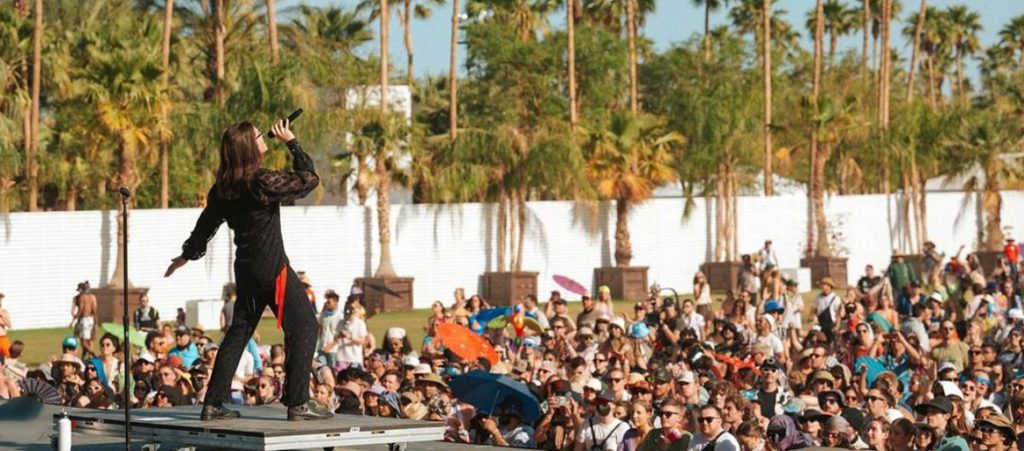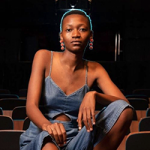
This year’s Coachella music festival – aka the influencer Olympics – sent debates about the ‘sanctity’ and changing nature of music festivals into overdrive. It feels like the slow transformation of live music is almost complete; once a pivotal moment of young adulthood, now primarily a content-gathering exercise for everyone involved. Even though posting our lives on social media is nothing new, the vibe shift taking place at gigs, concerts and festivals is worth examining for the impact it’s having on the live music industry and the identities of young people.
Everything is content
For the past decade, festivals like Coachella have become much more than just a place to enjoy music and culture. They are places to be seen. What started with celeb-spotting (show us the photos of Kate Moss, Vanessa Hudgens) has evolved into a habit of documentation that all festival-goers participate in. Dynamic and vibrant, festivals are like immersive content farms that providing multiple days of content opportunities – you’re guaranteed at least one really great photo, and a chance at internet virality, alongside seeing your favourite artist perform live. In a world where one great video can launch a career, it’s a pretty good deal.
Coachella is the heart of this change because it offers the most opportunities. Before the two festival weekends even arrive, the months leading up allow time for people to share survival tips, curated playlists, beauty and outfit inspiration. After the festival ends, the looks and parties are reviewed by millions (billions?) of online judges to determine who captured the zeitgeist best and who fell flat. By consuming content from media outlets, influencers and everyday people who attend, in a way it feels like you get to participate in the ‘moment’ of Coachella too.
Festivals have always been a spectacle, but that energy is now spreading to other live music scenes and events too. Taylor Swift fans have shared every last detail of their Eras Tour experience – from set list predictions, to extravagant outfit preparations and essentially uploading the entire performance, of every concert so far, to the Internet in grainy clips. Harry Styles’ global Love on Tour was a similar parade of costume-y outfits and attention-grabbing signs.
Who started it? Predictably, the big corporations for whom live music events are marketing opportunities – and the influencers, for whom working with these corporations is their job. Social posts related to Coachella reportedly received 12.65% more views and 18.16% more likes than other topics. That’s important context for the recent revelation by influencer Loren Gray that a lot of creators make content pretending to be at the festival: “They’ll go out to the desert get like an Airbnb, stay with someone, get their outfits, get their hair, get their makeup, post up ‘Coachella day one’… and they don’t go to the festival.” Regardless of whether you feel duped by that or not, it works – TikTokker Brianna Renee admitted in a since-deleted post that she was making Coachella-themed content for Honey Birdette, even though she didn’t attend the festival this year.
There’s nothing inherently wrong with wanting to post to social media at a concert – it’s fun! And it can be a powerful way to feel part of a community. There’s nothing wrong with influencers working for a paycheck, either. But is it weird that the behaviour of regular attendees is so impacted by the working relationship between brands and influencers, that we now feel under the same pressure to document these experiences with on-trend, engaging content… even though we don’t get paid for it?
The impact on artists
The live music vibe shift is having an impact on artists too, of course. You might think that having lots of content circulating around your performances would have a positive effect overall, but the reality for most artists is pretty grim.
Australian rapper Urth Boy recently shared on Twitter that he and other artists are having to cancel shows because of unprecedented low ticket sales. There are a lot of reasons for this – lingering COVID-19 concerns and the savage cost-of-living crisis are high on the list. Add to that: if we now view live music as content opportunity, rather than a cultural experience, we need different reasons to buy tickets. Is the venue aesthetic? Can you expect outrageous antics – from the the artist or fans – to film and post? And now that others are guaranteed to film-and-post for you, is it worth paying for something you’ll get to ‘experience’ for free on your phone after the show?
Maybe that’s why even Coachella took a hit to their ticket sales this year. The festival usually sells out within hours of release, but still had tickets available to purchase for Weekend Two on the day of.
Ultimately, the biggest winners are corporations, rather than artists or event festival organisers. Live music has always been an effective way for advertisers to connect with young people and earn some of the ‘cool factor’ of the music industry. Why would they pump the brakes on the content overload when it helps them reach even more people? Concerts and festivals are now being streamed – either for free, or in commercial deals with streaming platforms – devaluing the IRL experience even further. Very little of the extra money that this generates ends up in the pockets of artists and crew who make these events happen (especially smaller acts), while creating yet another reason you don’t need go see your faves live.
A deep impact on you
Hate it to break it to you, but these changing trends are having an impact on us too. Young adulthood is the time to develop our identities – a major part of this is exploring and engaging fully in new experiences that will shape who we become. Besides being very fun, going to a concert chaperoned by your parents, and eventually attending festivals and gigs on your has been a rite of passage for a long time. These are some of the first moments of independence and memory-making in our teens and twenties.
How we participate in these identity-shaping moments has now changed, perhaps forever. Gen Z is already being called out for fumbling concert etiquette by artists, older fans and articles titled “Why Do Live Music Audiences Suck Right Now?” A lot of these complaints boil down to our focus on creating a viral moment to impress strangers on the internet, no matter how inconsiderate.
As with so many aspects of current youth culture, this isn’t just about music festivals. The angst, discourse and criticism around gig-going behaviour is a reaction to a bigger shift in priorities among our generation. It’s starting to feel like we’re living our entire lives content-first. Many significant coming-of-age events are now focussed on how they might be documented, rather than how we participate in them. Remember the food blogger phrase, ‘phones eat first’? Now our phones watch live music first, are the first to hear gossip, and are the main guest of honour at birthday parties.
Slowly, and it seems surely, every experience will become a backdrop for content. As we strive to be good content-gatherers – for validation or just because it’s the thing to do – do we miss out on actually enjoying and engaging in it to the fullest? What happens when we continue to rob ourselves of identity-shaping experiences?
Yes, this does all sound a bit “kids-and-their-phones-these-days.” But it’s worth considering whether content-first culture is creating a sense of anxiety for anyone who participates in it. Right now, that’s basically everyone. Documenting life online can be a great way to find community and shape our point-of-view. But we should be more critical of what we stand to lose by flattening everything fun, interesting, challenging and exciting about life into a 2D-version of itself. Festivals included.




Comments are closed.